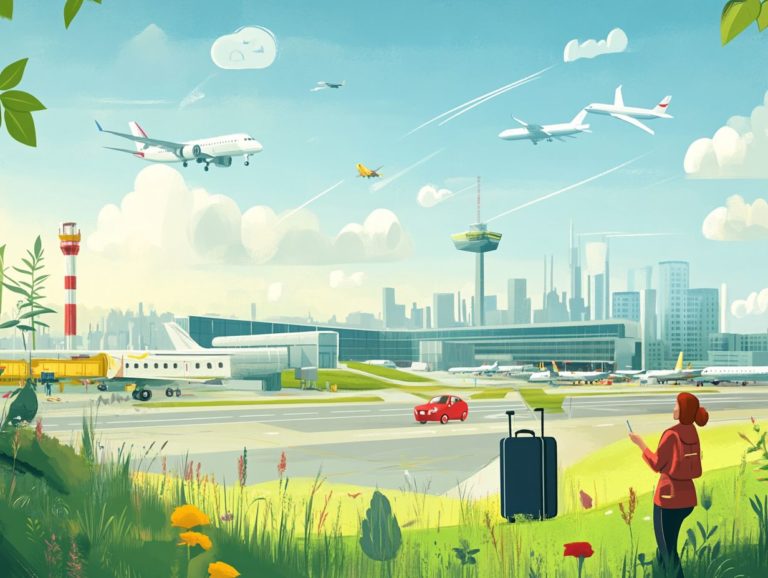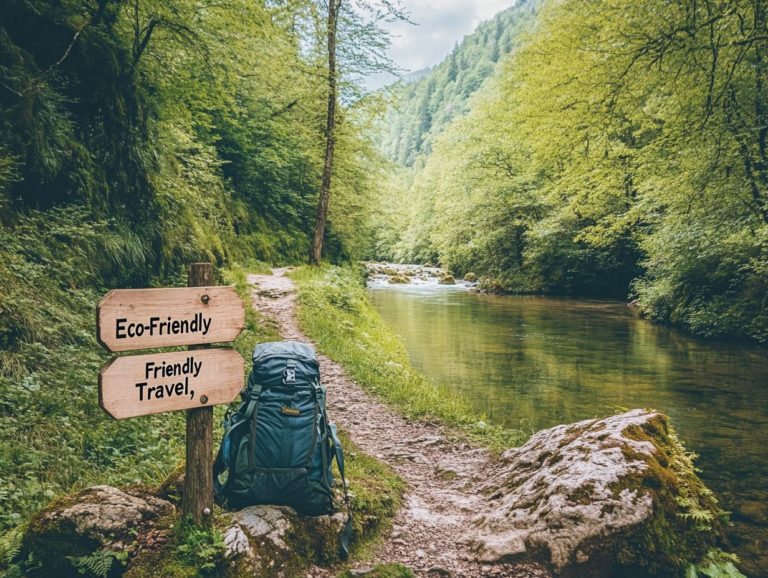5 Sustainable Practices for Business Travelers
In today s world, business travel is often a necessity, but it doesn t have to come at the expense of our planet. As awareness of environmental issues continues to rise, you might find yourself looking for ways to minimize your ecological footprint while on the road.
This article delves into five practical, sustainable practices tailored specifically for business travelers. From selecting eco-friendly accommodations and supporting local businesses to minimizing waste and offsetting carbon emissions, these strategies empower you to make a positive impact during your travels.
Explore how small changes can transform your travel experience into a more responsible and enjoyable journey.
Contents
- Key Takeaways:
- 1. Choose Eco-Friendly Accommodations
- 2. Use Public Transportation or Walk Whenever Possible
- 3. Minimize Waste and Plastic Usage
- 4. Support Local Businesses and Sustainable Tourism
- 5. Offset Your Carbon Footprint
- How Can Business Travelers Be More Environmentally Conscious?
- What Are the Environmental Impacts of Business Travel?
- How Can Businesses Encourage Sustainable Practices for Their Employees?
- What Are Some Tips for Packing Sustainably for Business Travel?
- How Can Business Travelers Support Local Communities?
- What Are Some Sustainable Alternatives to Flying for Business Travel?
- Frequently Asked Questions
- What are the 5 sustainable practices for business travelers?
- How can I reduce paper waste while traveling for business?
- What are some eco-friendly transportation options for business travel?
- Why should I stay at eco-friendly accommodations during business trips?
- How can I support local businesses while on a business trip?
- What are some ways to conserve energy and water while traveling for business?
Key Takeaways:
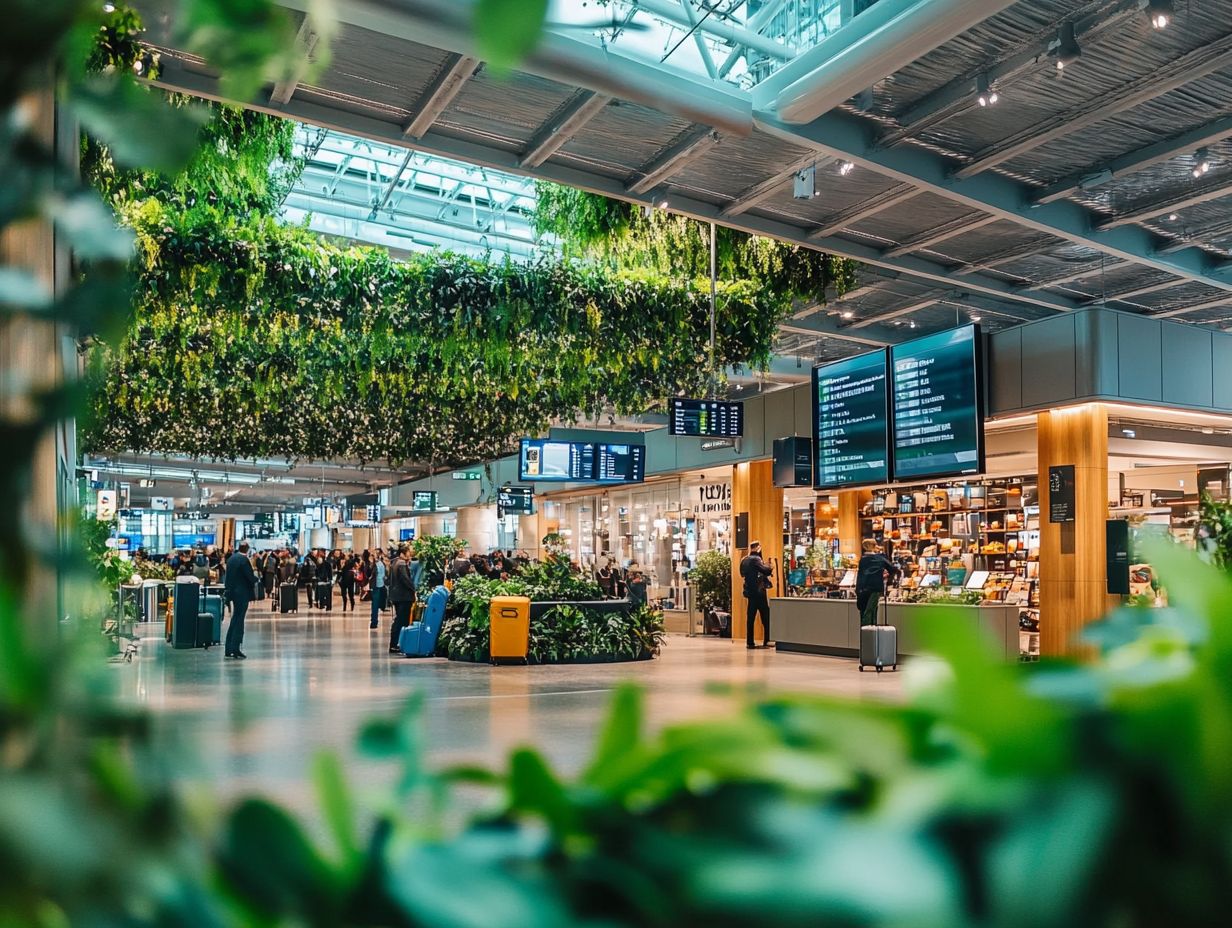
- Choose eco-friendly accommodations to reduce your environmental impact.
- Use public transportation or walk to decrease air pollution and carbon emissions.
- Bring reusable items and avoid single-use products to minimize waste.
1. Choose Eco-Friendly Accommodations
Choosing eco-friendly accommodations is a vital step for you as a business traveler looking to minimize your environmental impact. These hotels often embrace sustainable practices that contribute to emissions reduction and champion resource conservation.
They also foster a commitment to educating travelers about ethical consumption. You ll find many of these establishments proudly showcasing certifications like LEED (a certification for environmentally friendly buildings) and Green Key, which reflect their dedication to environmental stewardship.
These eco-friendly hotels typically incorporate low-flow fixtures, renewable energy sources, and sustainable building materials to shrink their carbon footprints. By prioritizing these green practices, you can enjoy your stay while actively supporting the planet.
Platforms like Booking.com now provide filters to help you discover accommodations with sustainable credentials, enabling you to make informed choices that resonate with your values. The wide array of options available ensures that you can find suitable lodging without sacrificing comfort or convenience.
2. Use Public Transportation or Walk Whenever Possible
Using public transportation or walking cuts down on carbon emissions linked to business travel. This eco-friendly choice also saves you money and enhances travel efficiency.
In vibrant cities like Tokyo and Paris, their well-organized transit systems elevate mobility and offer seamless connectivity, making it a breeze to navigate from one destination to another.
By taking advantage of local subways, buses, and trains, you can immerse yourself in the local culture while minimizing your environmental footprint. If you’re new to a city’s transit network, you can rely on app-based ticketing services and route planners, ensuring a smooth journey without the stress of navigating unfamiliar streets.
3. Minimize Waste and Plastic Usage
Minimizing waste and cutting down on single-use plastics are essential practices for you as a business traveler seeking to showcase your commitment to environmental responsibility.
Choose reusable products, like stainless steel water bottles and eco-friendly bags, instead of relying on disposable options. By making thoughtful choices, such as using cloth napkins, you ll make a real difference in reducing your environmental footprint.
The travel industry has a substantial impact on plastic waste, which endangers wildlife. As more travelers like yourself embrace sustainable practices, the demand for change within the industry intensifies. This paves the way for a united movement aimed at cutting pollution and championing eco-friendly travel options.
Start your sustainable travel journey today and make every trip count!
4. Support Local Businesses and Sustainable Tourism
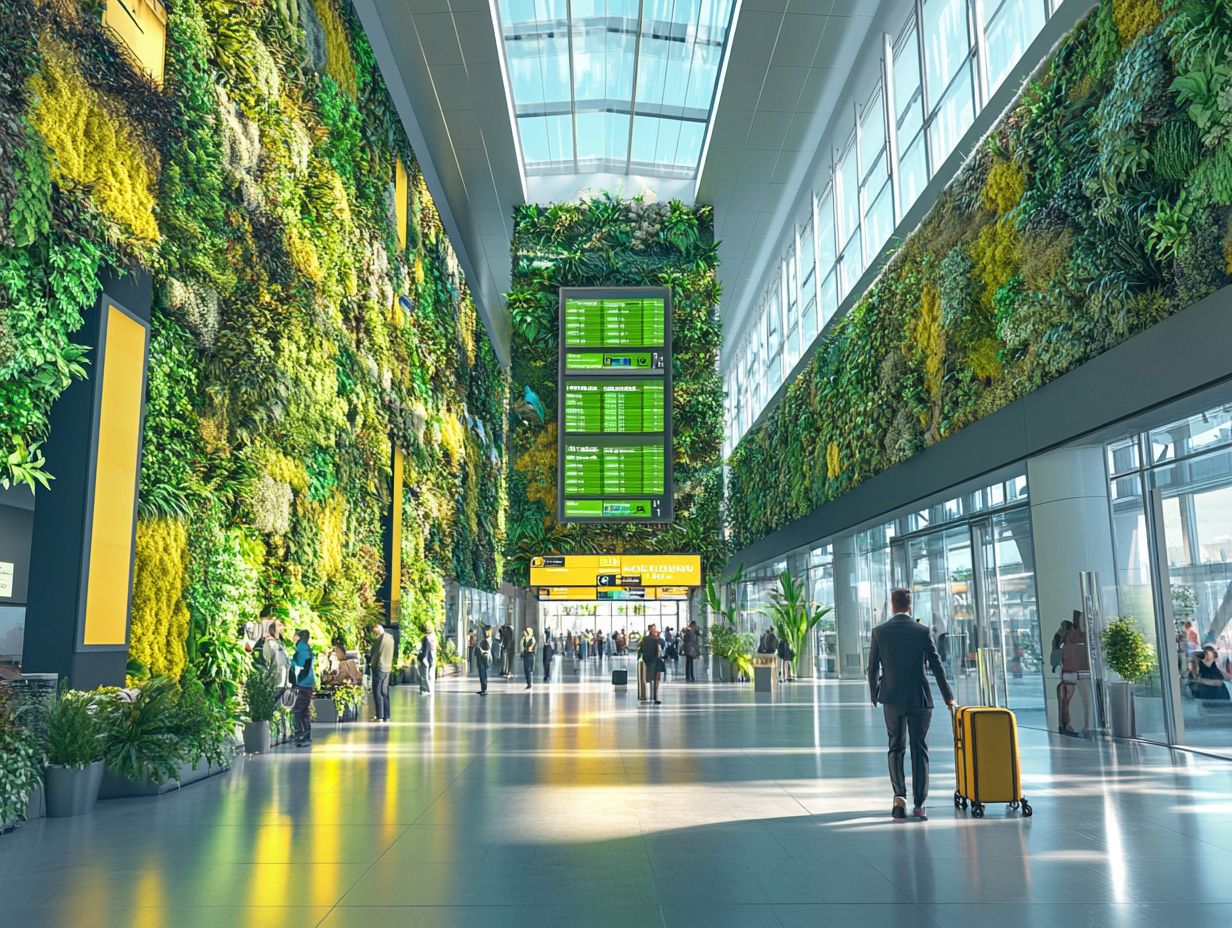
Supporting local businesses and practicing responsible tourism not only enhances your travel experience but also fosters community support and promotes ethical consumption among discerning travelers like you.
When you choose local restaurants and shops, you enjoy an authentic taste of the region’s culinary delights, discovering dishes crafted from fresh, locally sourced ingredients. These dining experiences go beyond mere sustenance; they incorporate cultural elements that highlight the area s rich heritage.
By choosing to patronize local establishments, you play a vital role in stimulating the local economy, ensuring that more money circulates within the community. This commitment helps preserve jobs and champions sustainable tourism practices that emphasize environmental stewardship and cultural preservation.
Ultimately, this leads to a travel experience that is both enriching and meaningful.
5. Offset Your Carbon Footprint
Offsetting your carbon footprint through carbon offset programs is a commendable strategy for business travelers dedicated to reducing greenhouse gas emissions and tackling urgent environmental issues.
These initiatives lessen the environmental impact of travel and play a vital role in global sustainability efforts. Take action now and get involved in programs that fund renewable energy projects, like wind and solar energy farms, or support reforestation efforts to restore essential ecosystems.
Renowned organizations such as the United Nations Carbon Offset Platform and reputable platforms like Gold Standard provide trustworthy options for purchasing carbon credits. By engaging with these platforms, you can select projects that align with your values, transforming your travels into meaningful opportunities for positive environmental change.
How Can Business Travelers Be More Environmentally Conscious?
As a business traveler, you can incorporate environmentally conscious practices into your travel policies. By making eco-friendly choices and prioritizing traveler education, you can significantly reduce your environmental footprint during your trips.
Selecting accommodations that promote sustainability, like hotels with green certifications, allows you to make a meaningful impact. For a comprehensive approach, learn how to plan a sustainable travel itinerary. You can also minimize waste by using reusable items, which helps cut down on single-use plastics that often accompany travel.
Opt for low-impact travel methods, such as trains or electric vehicles instead of air travel whenever feasible. Your organization plays a crucial role in fostering these practices by providing resources and guidelines that encourage you to prioritize sustainability in your travel decisions.
This ultimately cultivates a culture of environmental responsibility across the organization.
What Are the Environmental Impacts of Business Travel?
The environmental impacts of business travel are significant, largely due to the carbon footprint associated with air travel, accommodations, and local transportation. It s essential to focus on emissions reduction through informed travel choices.
When your company sends employees on trips, the carbon emissions can be staggering. Air travel, especially long-haul flights, releases massive amounts of greenhouse gases, while the energy consumption of hotels adds to the problem. To mitigate this impact, consider following the best practices for sustainable road trips. Ground transportation, whether it’s taxis, rental cars, or ride-sharing services, also contributes to this intricate equation.
To counter these impacts, consider exploring alternatives like virtual meetings or opting for rail travel when it s a viable option. By emphasizing sustainable practices such as selecting eco-friendly hotels and utilizing public transportation you can significantly reduce the carbon footprint of business trips.
Start making eco-conscious choices in your next business trip today!
How Can Businesses Encourage Sustainable Practices for Their Employees?

You can champion sustainable practices for your employees by developing strong travel management policies. Focus on educating travelers and encouraging eco-friendly choices.
By integrating specific guidelines, such as recommending eco-friendly accommodations, you can reduce your carbon footprint and elevate your corporate image. Implementing 5 ways to offset your travel carbon footprint allows you to take responsibility for emissions generated during travel, showcasing your commitment to environmental stewardship.
Offering sustainable travel options, like incentives for public transportation or carpooling initiatives, can significantly cut down on emissions. Implementing the top sustainable travel practices is essential in promoting responsible business practices. This motivates you to adopt these initiatives and reinforces a culture of accountability among employees while demonstrating your dedication to sustainability.
What Are Some Tips for Packing Sustainably for Business Travel?
Sustainable packing means thoughtfully selecting items that minimize waste, like reusable products and eco-friendly materials, while optimizing your travel logistics for maximum efficiency.
This approach encourages you to choose versatile clothing that can be easily mixed and matched for various occasions. It also highlights the importance of seeking out eco-friendly luggage made from recycled or sustainable materials.
By prioritizing items with multiple uses and opting for durable, long-lasting products, you can drastically cut down on single-use items like plastic bags and disposable toiletries.
Each of these intentional choices contributes to a smaller environmental footprint, creating a ripple effect that inspires others to embrace the best sustainable hotels for business travelers while on the go.
How Can Business Travelers Support Local Communities?
As a business traveler, you have a unique opportunity to actively support local communities through your choices. By opting to dine at local restaurants and engaging in sustainable tourism practices, you contribute positively to the local economy.
When you shop at local markets and connect with artisans, you enhance your travel experience and play a vital role in preserving cultural heritage.
Participating in community events, such as festivals or volunteer activities, allows you to forge meaningful connections and create lasting memories. These thoughtful actions instill a sense of pride among locals and promote sustainable practices that safeguard the environment.
By prioritizing ethical consumption, you can immerse yourself in authentic experiences and discover unique products, fostering a mutually beneficial relationship that supports local growth and development.
What Are Some Sustainable Alternatives to Flying for Business Travel?
Exploring sustainable alternatives to flying, such as opting for fuel-efficient vehicles, trains, or public transportation, allows you to significantly reduce the environmental impact of business travel while enjoying low-impact travel options.
These alternatives not only lessen your carbon footprint but can also be more time-efficient, especially for shorter distances. For instance, high-speed trains in Europe and parts of Asia connect major cities at speeds that often outpace air travel, particularly when factoring in airport wait times.
In regions like the Pacific Northwest, you can experience scenic rail journeys that elevate your travel experience, free from the stress of flying. By embracing these travel methods, you foster eco-friendly practices while ensuring your team reaches their destinations effectively.
Frequently Asked Questions
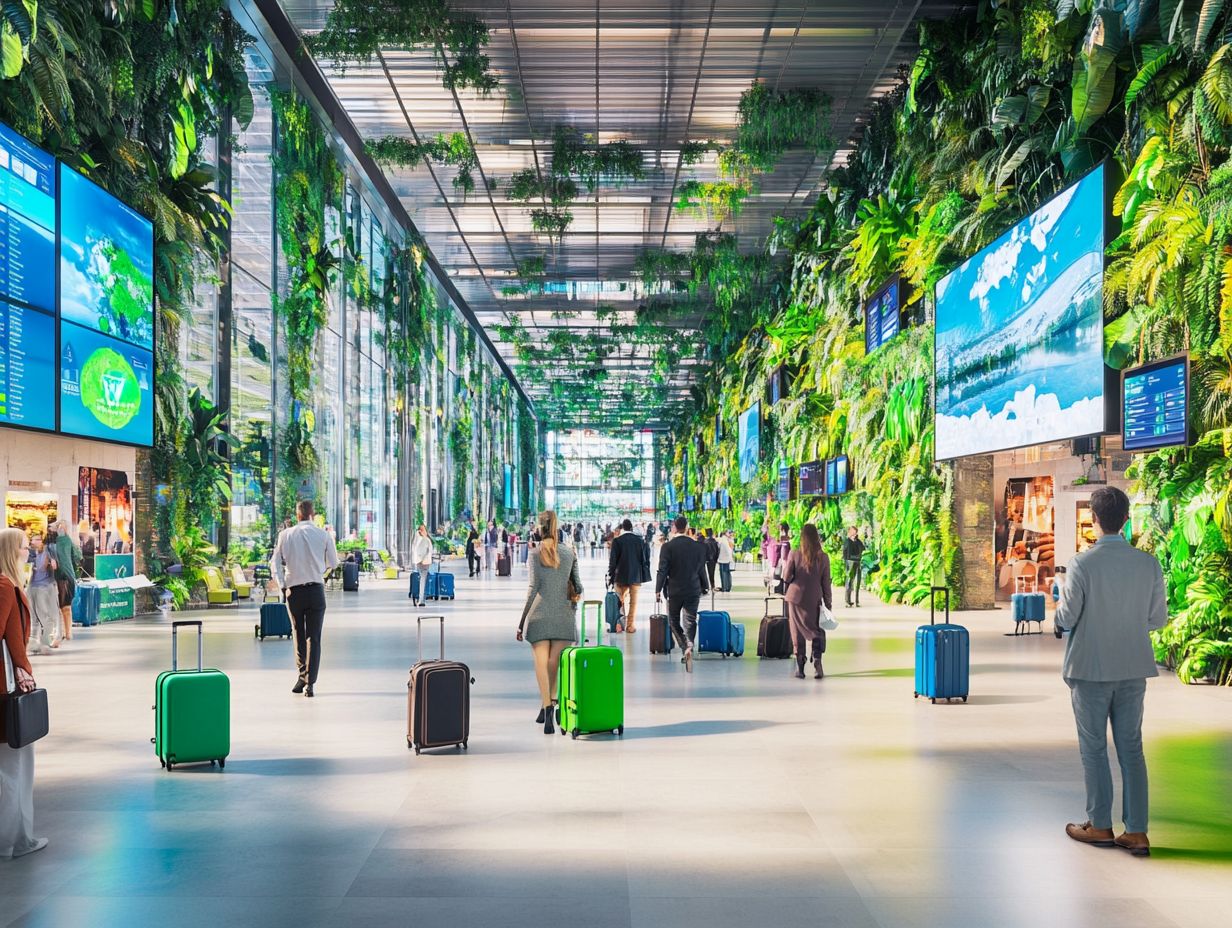
What are the 5 sustainable practices for business travelers?
The 5 sustainable practices for business travelers include reducing paper waste, using environmentally friendly transportation, staying at eco-friendly accommodations, supporting local businesses, and conserving energy and water.
How can I reduce paper waste while traveling for business?
Reduce paper waste by using electronic tickets and receipts. Opt for digital documents and notes, and avoid printing unless absolutely necessary.
What are some eco-friendly transportation options for business travel?
Choose eco-friendly transport like public transit, biking, or walking. Consider using electric or hybrid vehicles for your trips.
Why should I stay at eco-friendly accommodations during business trips?
Staying at eco-friendly hotels lowers your carbon footprint, which means you re using less energy and resources. It also supports businesses committed to sustainability.
How can I support local businesses while on a business trip?
Support local businesses by dining at locally-owned restaurants. Purchase souvenirs from local shops and book tours with local companies.
What are some ways to conserve energy and water while traveling for business?
Conserve energy by turning off lights and electronics when not in use. Take shorter showers and reuse towels and linens at your hotel.



